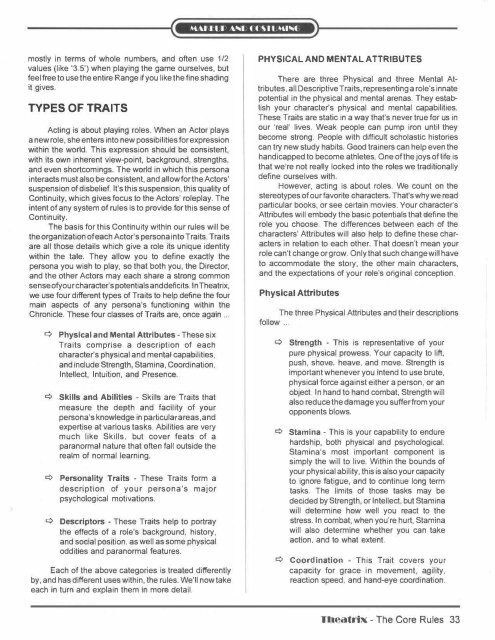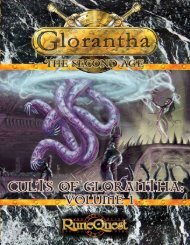Untitled - Index of - Free
Untitled - Index of - Free
Untitled - Index of - Free
You also want an ePaper? Increase the reach of your titles
YUMPU automatically turns print PDFs into web optimized ePapers that Google loves.
mostly in terms <strong>of</strong> whole numbers, and <strong>of</strong>ten use 1/2<br />
values (like '3.5') when playing the game ourselves, but<br />
feel free to use the entire Range if you like the fine shading<br />
it gives.<br />
TYPES OF TRAITS<br />
Acting is about playing roles. When an Actor plays<br />
a new role, she enters into new possibilities for expression<br />
within the world. This expression should be consistent,<br />
with its own inherent view-point, background, strengths,<br />
and even shortcomings. The world in which this persona<br />
interacts must also be consistent, and allow for the Actors'<br />
suspension <strong>of</strong> disbelief. It's this suspension, this quality <strong>of</strong><br />
Continuity, which gives focus to the Actors' roleplay. The<br />
intent <strong>of</strong> any system <strong>of</strong> rules is to provide for this sense <strong>of</strong><br />
Continuity.<br />
The basis for this Continuity within our rules will be<br />
the organization <strong>of</strong> each Actor's persona into Traits. Traits<br />
are all those details which give a role its unique identity<br />
within the tale. They allow you to define exactly the<br />
persona you wish to play, so that both you, the Director,<br />
and the other Actors may each share a strong common<br />
sense <strong>of</strong>your character's potentials and deficits. In Theatrix,<br />
we use four different types <strong>of</strong> Traits to help define the four<br />
main aspects <strong>of</strong> any persona's functioning within the<br />
Chronicle. These four classes <strong>of</strong> Traits are, once again ...<br />
Physical and Mental Attributes- These six<br />
Traits comprise a description <strong>of</strong> each<br />
character's physical and mental capabilities,<br />
and include Strength, Stamina, Coordination,<br />
Intellect, Intuition, and Presence.<br />
Skills and Abilities - Skills are Traits that<br />
measure the depth and facility <strong>of</strong> your<br />
persona's knowledge in particular areas, and<br />
expertise at various tasks. Abilities are very<br />
much like Skills, but cover feats <strong>of</strong> a<br />
paranormal nature that <strong>of</strong>ten fall outside the<br />
realm <strong>of</strong> normal learning.<br />
Personality Traits - These Traits form a<br />
description <strong>of</strong> your persona's major<br />
psychological motivations.<br />
Descriptors - These Traits help to portray<br />
the effects <strong>of</strong> a role's background, history,<br />
and social position, as well as some physical<br />
oddities and paranormal features.<br />
Each <strong>of</strong> the above categories is treated differently<br />
by, and has different uses within, the rules. We'll now take<br />
each in turn and explain them in more detail.<br />
PHYSICAL AND MENTAL ATTRIBUTES<br />
There are three Physical and three Mental At<br />
tributes, all Descriptive Traits, representing a role's innate<br />
potential in the physical and mental arenas. They estab<br />
lish your character's physical and mental capabilities.<br />
These Traits are static in a way that's never true for us in<br />
our 'real' lives. Weak people can pump iron until they<br />
become strong. People with difficult scholastic histories<br />
can try new study habits. Good trainers can help even the<br />
handicapped to become athletes. One <strong>of</strong> the joys <strong>of</strong> life is<br />
that we're not really locked into the roles we traditionally<br />
define ourselves with.<br />
However, acting is about roles. We count on the<br />
stereotypes <strong>of</strong> our favorite characters. That's why we read<br />
particular books, or see certain movies. Your character's<br />
Attributes will embody the basic potentials that define the<br />
role you choose. The differences between each <strong>of</strong> the<br />
characters' Attributes will also help to define these char<br />
acters in relation to each other. That doesn't mean your<br />
role can't change or grow. Only that such change will have<br />
to accommodate the story, the other main characters,<br />
and the expectations <strong>of</strong> your role's original conception.<br />
Physical Attributes<br />
follow ...<br />
The three Physical Attributes and their descriptions<br />
Strength - This is representative <strong>of</strong> your<br />
pure physical prowess. Your capacity to lift,<br />
push, shove, heave, and move. Strength is<br />
important whenever you intend to use brute,<br />
physical force against either a person, or an<br />
object. In hand to hand combat, Strength will<br />
also reduce the damage you suffer from your<br />
opponents blows.<br />
Stamina - This is your capability to endure<br />
hardship, both physical and psychological.<br />
Stamina's most important component is<br />
simply the will to live. Within the bounds <strong>of</strong><br />
your physical ability, this is also your capacity<br />
to ignore fatigue, and to continue long term<br />
tasks. The limits <strong>of</strong> those tasks may be<br />
decided by Strength, or Intellect, but Stamina<br />
will determine how well you react to the<br />
stress. In combat, when you're hurt, Stamina<br />
will also determine whether you can take<br />
action, and to what extent.<br />
Coordination - This Trait covers your<br />
capacity for grace in movement, agility,<br />
reaction speed, and hand-eye coordination.<br />
Theatrlx - The Core Rules 33



